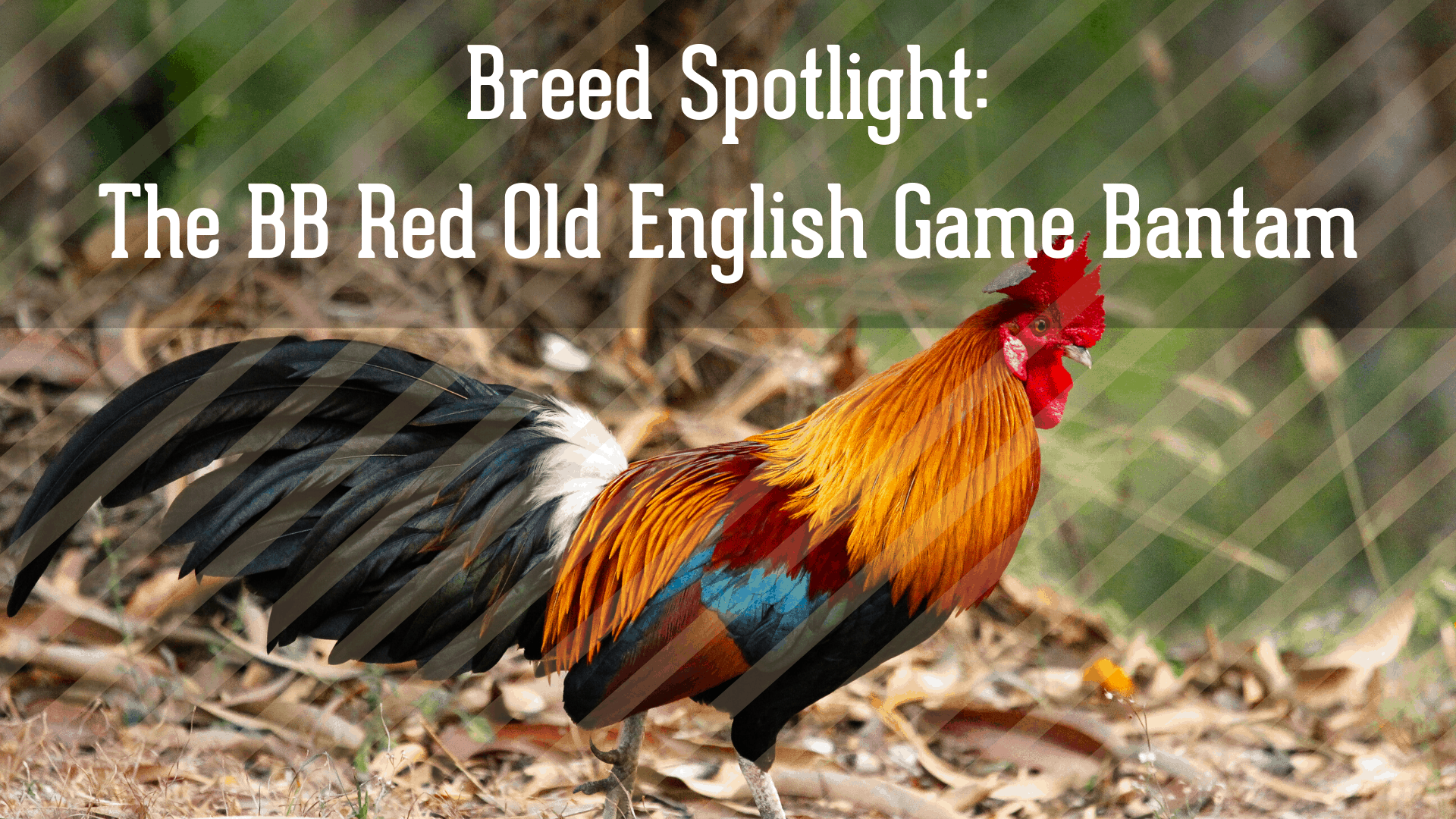
The Black Breasted Red Old English Bantam (BB Red Old English) is a breed with a rich history and a supportive enthusiastic fan base.
This little chicken is a heritage breed that originated in England. The BB Red Old English was considered a game bird, meaning it was often used in cockfights.
And it’s no wonder, this little bird has no idea how small he is!
Luckily, in 1849, the sport of cockfighting was banned, and the BB Red Old English became an exhibitionist bird for lovers of this cocky-looking little breed.
Read on to learn everything you need to know about the BB Red Old English Game bantam:
The BB Red Old English Bantam
Bantam, in the chicken world, means fun-sized. In other words, bantams are a variety of chicken that tend to be on the smaller end of the sizing spectrum.
At maturity, roosters weigh in around 2lbs while hens are smaller at about 1.5 lbs. So yes, this is an itty-bitty bird…with an attitude to delight chicken fanciers of all kinds.
1. Physical Appearance of the BB Red Old English
The BB Old English Red is a plucky little bird with an extremely upright stance, which may-or-may-not attribute to its egotistical appearance. Rest assured, though, the BB Red isn’t as sassy as she looks. In fact, some say that rather than a fighter, she’s a lover and, in truth, a friendly little bird.
At maturity, the BB Red Old Enlgish sports splashes of bright orange and red plumage contrasting against iridescent black and green. Roosters are a magnificent sight to see and, in part, that is why ehibitionists and breeders love adding this little chicken to their flocks.
Hens are lovely in their own way, though they aren’t as flashy as the boys in the flock. Female will showcase hints of copper on her neck and tawny brown feathering on her wings and body.
2. BB Red Old English Egg Production and Appearance
You’ll be pleased to learn that the BB Red lays a fair amount of bite-sized eggs throughout the year. These little poppers are perfect for mini-deviled eggs for your next summer picnic. Yum!
With proper care and nutrition, hens can lay up to 120 tiny white eggs yearly.
3. Temperament
It’s easy to assume that the BB Red Old English bantam is a bully due to his history as a cock fighter, but on the contrary, this little banty tends to have raving fans due to his casual demeanor.
Of course, there’s always a wide variety of personalities within the breed and while the BB Red Old English Game isn’t aggressive, it is a very active little bird.
Some might even call it a flighty chicken.
And when it comes to broody behavior, don’t expect hens to raise their own chick, as they rarely become broody. If it’s your goal to breed this spunky little bird, consider investing in an incubator to do the heavy lifting for your hens.
Lastly, when it comes to temperament, the BB Red Old English is a savvy forager. And while their small size makes them a prime prey target, they are fantastic free-rangers if they are provided with appropriate protection from predators.
4. Hardiness
While the BB Red can thrive in colder climates, he prefers to live where it’s warm. This little bird has a tall comb, which can be a recipe for frostbite during the winter. Their feathers are also fairly tight, and close, to their bodies, which also makes them less tolerant of cold climates.
If you want to keep this breed in the northern hemisphere, provide shelter in a draft-free environment, and plan on practicing some frostbite prevention throughout the winter if you want to keep those combs standing tall.
Why We Love the BB Red Old English Game Bantam
We love the BB Red Old English Bantam because of his beautiful coloring, humorous posture, and compact size.
The BB Red Old English is perfect for fanciers who love to have an ornamental flock gracing their front yard or for those who enjoy showing chickens each year. This is a breed that has come a long way and deserves only the best going forward.
This is a very new, and popular breed at our hatchery, so if you’re interested in decorating your yard with this perky little bird this year, reserve your chicks today.
–By: Amanda Pieper.
